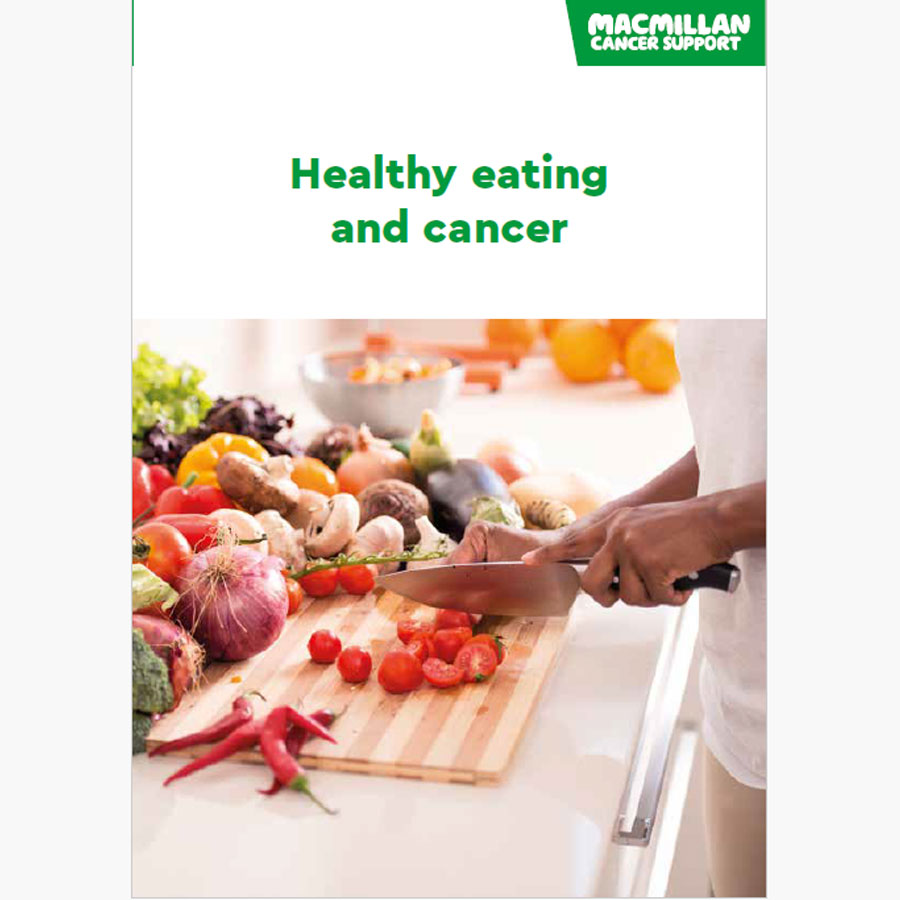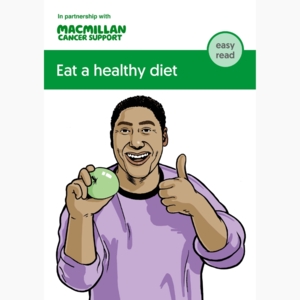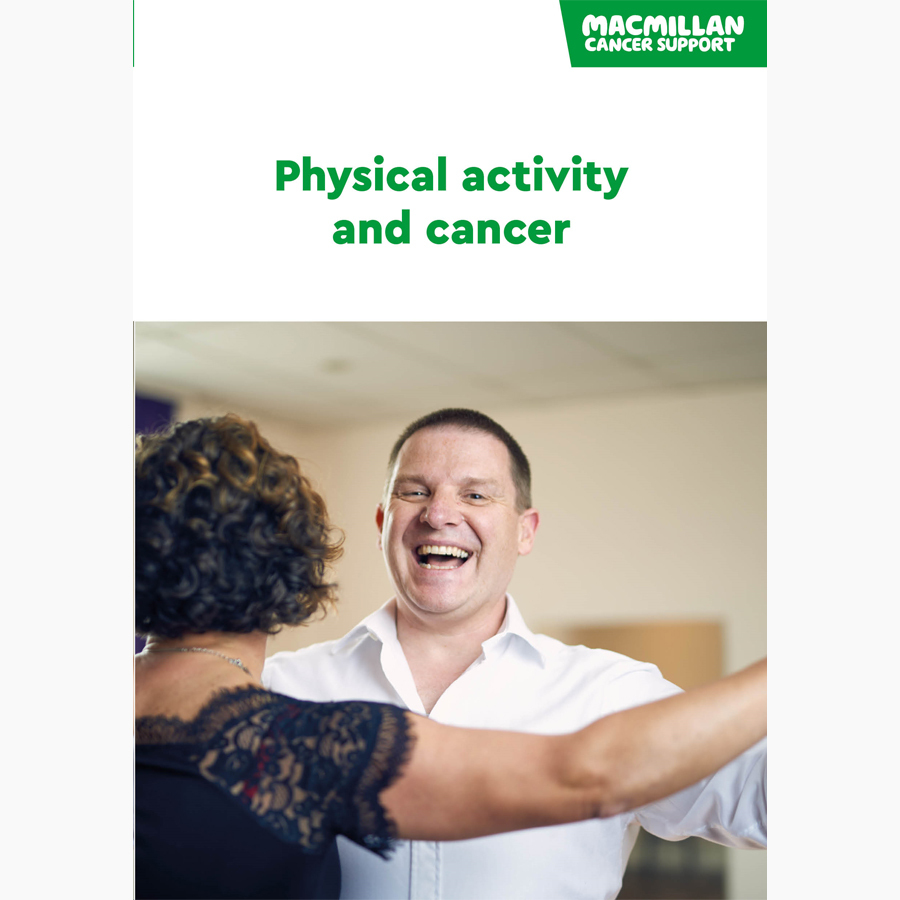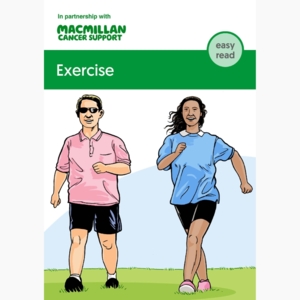Keeping your bones healthy
What can I do to improve my bone health?
The following suggestions can help improve and maintain your bone health and reduce your risk of osteoporosis (bone density that is much lower than normal).
They are also good for your general health. Keeping your bones healthy is important throughout your life, not just during cancer treatment. These changes are helpful for everyone, not just people affected by cancer.
Which foods are good for bone health?
Eat a healthy and balanced diet. Try to include foods that have calcium and vitamin D. This will help keep bones strong and healthy.
A balanced diet includes:
- fruit and vegetables
- protein, such as meat, fish, soya beans and lentils
- carbohydrates (starchy foods), such as rice, bread, pasta, potatoes and whole grains
- milk and dairy products, such as yoghurt and cheese or non-dairy alternatives
- a small amount of foods that are high in fat, salt and sugar.
We have more information about healthy eating and cancer. You can also get more information from the British Dietetic Association (BDA).
Calcium
Public health bodies in the UK recommend most adults should have 700mg of calcium a day. If you have osteoporosis, your doctor may advise that you have 1,000mg a day.
Foods that have a lot of calcium include:
- dairy products – these contain the highest amounts of calcium
- tinned oily fish where you eat the bones, such as sardines
- leafy green vegetables, such as broccoli and curly kale
- nuts
- soya beans, tofu, kidney beans and baked beans
- dried fruit, such as figs, apricots and raisins.
If you have a dairy-free diet, make sure you eat non-dairy foods that have calcium. You may also choose to have products with added calcium. These include some types of fortified non-dairy milks and orange juice. Always shake the container well before drinking. This makes sure the calcium is mixed through the drink.
Some foods and drinks can upset the calcium balance in the body.
Try not to have large amounts of:
- caffeine
- red meat
- salt
- fizzy drinks that contain phosphates, such as cola.
The Royal Osteoporosis Society has more information about the amount of calcium in specific foods.
Booklets and resources
Which vitamins are best for bone health?
Vitamin D helps the body absorb calcium. It is important to get enough vitamin D to maintain healthy bones and muscles.
Sunlight is the best natural source of vitamin D. Getting sunlight on your skin every day between 11am and 3pm, from May until September, increases vitamin D levels.
It is recommended that adults get 10 minutes of sun to the skin without sun cream, once or twice a day. This may depend on your skin type. But take care not to burn, especially during strong sunshine. On cloudy days, it will take longer than 10 minutes to get enough vitamin D.
Your cancer doctor, specialist nurse or GP can advise whether this is safe for you. Some people may need to take more care when out in the sun, especially if they are having cancer treatment.
We only get a small amount of vitamin D from the food we eat. But it is important to include foods in your diet that have a lot of vitamin D, such as:
- oily fish
- red meat
- liver
- egg yolks
- fortified plant-based food products such as non-dairy milk – check the label to see if vitamin D has been added.
Some breakfast cereals, yoghurts or margarines have vitamin D added to them, including non-dairy alternatives. You can check the labels to find out.
Vitamin D supplements
During the autumn and winter when sunlight levels are low, it is difficult to get enough vitamin D. Guidelines suggest that people take a daily supplement of 10 micrograms (400 IU) of vitamin D. IU stands for International Units.
The government advises that people who are more likely to have low levels of vitamin D consider taking a vitamin D supplement all year round. This includes people who:
- cover their skin when outside
- have black and brown skin
- do not spend regular time outdoors every day, such as people who are housebound or in a care home
- may not be able to get enough vitamin D in their diet throughout the year.
You can buy vitamin D supplements from supermarkets, health food stores and pharmacies. If you are not sure what to buy, ask your GP or pharmacist for advice.
If you are having cancer treatment that increases the risk of osteoporosis, your GP or treatment team may prescribe vitamin D and calcium supplements.
If you have a vegan diet, the NHS has more information on having a healthy vegan diet.
Keep to alcohol guidelines
If you drink alcohol, keep within the recommended guidelines. Current drinking guidelines recommend that you drink no more than 2 units of alcohol a day or 14 units a week, spread over 3 or more days. It is also recommended that you have a couple of alcohol-free days each week.
One drink is not the same as 1 unit of alcohol. As a guide:
- a single measure (25ml) of spirits contains 1 unit
- half a pint (250ml) of standard strength (3% to 4%) beer, lager or cider contains 1 unit
- half a pint of stronger (5%) beer, lager or cider contains 1.5 units
- a standard glass (175ml) of wine (13%) contains 2 units
- a large glass (250ml) of wine (13%) contains 3 units.
Drinkaware has more information about alcohol and drinking guidelines.
Do not smoke
Physical activity and bone health
Physical activity and strength training makes bones stronger. It can also improve your co-ordination and balance, which makes you less likely to fall. Falls are a common cause of fractures, especially as you get older.
When exercising, do not push yourself too hard. If you are not used to exercising, start slowly and increase the amount gradually. At the end of an activity, you should feel warm and slightly out of breath, but not exhausted. With practice, you will soon find you are able to do more.
Talk to your GP, cancer doctor or specialist nurse before starting any exercise programme. If you have a physiotherapist, occupational therapist or dietitian, you can also get some advice from them. It is important to get advice if you have, or are at risk of, osteoporosis. Your GP, specialist nurse or other health professionals involved in your care can tell you if there are any exercises you should not do. They may be able to tell you if there are any exercise schemes in your area.
Booklets and resources
Types of exercise
There are lots of different ways to exercise. It is best to find something you enjoy. This will make it easier for you to keep doing it. You need to exercise regularly to get the most benefit.
It is best to do the following types of exercise:
- Activities that raise the heart rate for 30 minutes, five times a week. The 30 minutes could be made up of three, 10-minute periods of activity. This type of aerobic activity strengthens the heart and lungs.
- Physical activity that improves muscle strength on at least 2 days each week.
- Exercises to improve balance and co-ordination on at least 2 days each week.
Royal Osteoporosis Society have further information on this.
CanRehab Trust is an organisation that helps people living with and beyond cancer in the UK to become or stay active. CanRehab Trust has a register of approved personal trainers and health professionals qualified to provide tailored exercise programmes for people living with cancer.
Moving medicine has information about physical activity after a diagnosis of cancer. We also have more information on physical activity after a diagnosis of cancer.
Weight-bearing exercises
Exercise that is weight-bearing is particularly good for your bone health. These exercises include walking, jogging, skipping, climbing stairs, dancing and hiking. Swimming and cycling are good for your heart and health but are not weight bearing.
Weight-bearing exercises can be high-impact or low-impact.
High-impact exercises include:
- jogging
- hiking
- skipping
- racket sports like tennis
- some types of dancing.
Low-impact exercises include:
- walking outside or on a treadmill machine
- using any training machines, including a cross-training machine
- low-impact aerobic exercise
- stair-step machines.
Some people like to go to a gym and attend classes while others may like to join a walking group. Check with your doctor or a physiotherapist if high-impact exercises are safe for you to do. If you have a high risk of fractures, or have had a fracture in the past, you may be advised to only do low-impact exercises.
Strength-building exercises
These exercises strengthen muscles, bones and joints. They may also improve your balance. You can do them with:
- hand weights
- resistance exercise machines
- exercise (resistance) bands.
The Chartered Society of Physiotherapists (CSP) has videos explaining how to do strength-building exercises to make you feel stronger. Always talk to your cancer team before starting any strength-based exercises.
Exercises to improve balance and flexibility
Having flexible joints helps you stay flexible and prevents injuries and strains. Simple stretching exercises are a good way to start. They can also help you relax and reduce stress. Balance exercises help increase strength as well as balance. It is best to do these stretches as part of your daily routine. They will only take you a few minutes.
Exercises that are good for flexibility and balance include:
- yoga
- tai chi
- pilates
- body balance
- qi gong.
If you have osteoporosis, or have had a fracture in the past, avoid sudden movements or exercises where you bend forward and twist your waist. These movements can increase your risk of fractures in the spine.
The infographic below shows the type and amount of physical activity recommended for adults.
About our information
This information has been written, revised and edited by Macmillan Cancer Support’s Cancer Information Development team. It has been reviewed by expert medical and health professionals and people living with cancer.
-
References
Below is a sample of the sources used in our bone health and cancer information. If you would like more information about the sources we use, please contact us at informationproductionteam@macmillan.org.uk
National Institute for Health and Care Excellence. NICE. Osteoporosis - prevention of fragility fractures. Management, Prescribing information, Background Information. Available from: https://cks.nice.org.uk/topics/osteoporosis-prevention-of-fragility-fractures [accessed April 2024].
National Osteoporosis Guideline Group UK. Clinical guideline for the prevention and treatment of osteoporosis 2021. National Institute for Health and Care Excellence. NICE accredited. Available at: https://www.nogg.org.uk/sites/nogg/download/NOGG-Guideline-2021-f.pdf [accessed April 2024].
Coleman R, et al. European Society for Medical Oncology. Clinical Practice Guidelines – Bone health in cancer: ESMO Clinical Practice Guidelines. Ann Oncol. 2020. Available from: https://www.esmo.org/guidelines/guidelines-by-topic/supportive-and-palliative-care/bone-health-in-cancer-patients [accessed April 2024].
European Society for Medical Oncology. Patient Guide on Bone Health. Cancer can affect bone health in several ways such as by spreading to the bones (bone metastases) or cancer treatment causing bone loss, which makes the bones more fragile and likely to fracture. 2022. Available at: https://www.esmo.org/for-patients/patient-guides/bone-health-in-cancer [accessed April 2024].
Date reviewed

Our cancer information meets the PIF TICK quality mark.
This means it is easy to use, up-to-date and based on the latest evidence. Learn more about how we produce our information.
The language we use
We want everyone affected by cancer to feel our information is written for them.
We want our information to be as clear as possible. To do this, we try to:
- use plain English
- explain medical words
- use short sentences
- use illustrations to explain text
- structure the information clearly
- make sure important points are clear.
We use gender-inclusive language and talk to our readers as ‘you’ so that everyone feels included. Where clinically necessary we use the terms ‘men’ and ‘women’ or ‘male’ and ‘female’. For example, we do so when talking about parts of the body or mentioning statistics or research about who is affected.
You can read more about how we produce our information here.








